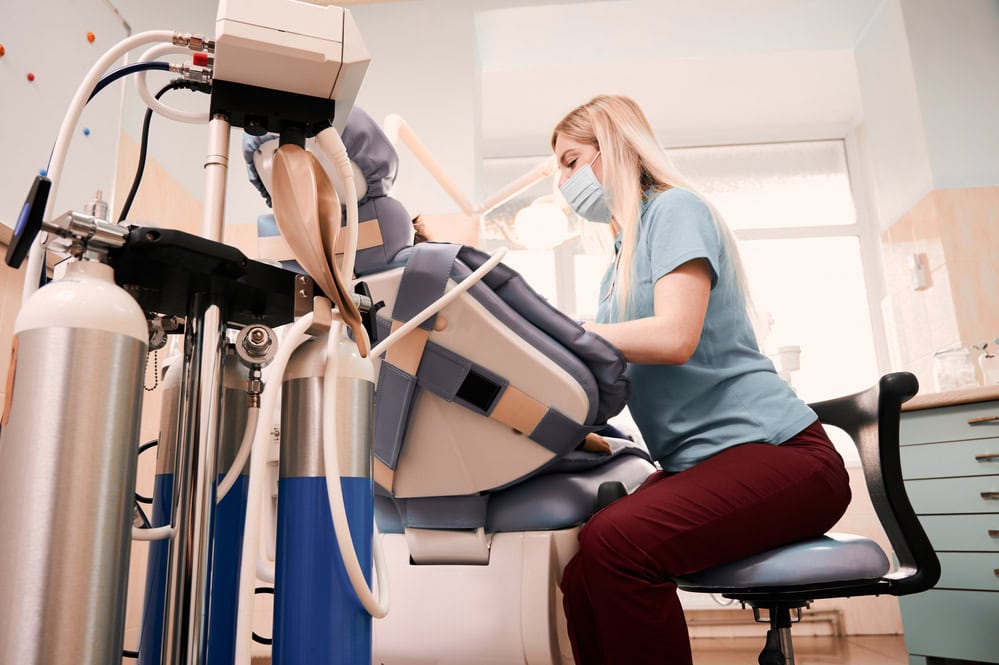Understanding the psychological phenomenon of dental anxiety is crucial in comprehending patient behaviour and ensuring optimal mental health outcomes in the context of dental care. Dental anxiety, also known as dental fear, is a common issue characterised by feelings of fear, apprehension, and stress associated with dental visits or procedures. This fear can range from mild uneasiness to severe phobia, impacting individuals of all ages.
Understanding dental anxiety is important because it significantly influences patient behaviour. Patients experiencing dental anxiety may avoid seeking necessary dental care, leading to deteriorating oral health and potential complications. By defining dental anxiety and recognising its manifestations, dental professionals can tailor their approach to provide a more supportive and comforting environment for anxious patients. Addressing dental anxiety improves the overall patient experience and contributes to better mental health outcomes and increased compliance with dental treatment plans.
To foster a positive relationship between patients and dental care providers, it is essential to approach dental anxiety with empathy and understanding.
Personal Negative Experiences
Personal negative experiences at the dentist can deeply impact an individual’s perception of dental care, potentially instilling long-lasting fear and anxiety. Traumatic visits, painful procedures, and negative outcomes during dental appointments can contribute to a person’s development of dental anxiety. These bad dental experiences can range from intense pain during a procedure to encountering an unsympathetic or rough dentist. Such negative dentist encounters can leave a lasting impression, leading to heightened anxiety surrounding future dental visits.
Personal dental trauma, whether stemming from a specific incident or a series of unpleasant experiences, can have a significant impact on one’s mental and emotional well-being. The fear of reliving past traumatic dental visits can prevent individuals from seeking necessary dental care, ultimately affecting their oral health. Overcoming dental anxiety rooted in personal experiences may require compassionate dental professionals who understand and address their patient’s underlying fears and concerns. By acknowledging and working through these past negative encounters, individuals can gradually rebuild their trust in dental care and alleviate their dental anxiety.
Fear of Pain
The apprehension of experiencing pain is a fundamental factor contributing to the development of dental anxiety. Fear of pain in dentistry can stem from various sources, such as past negative experiences, anticipation of discomfort during procedures, or heightened sensitivity to pain. For individuals with dental pain anxiety, the mere thought of upcoming dental visits can evoke feelings of dread and unease.
Pain perception is subjective, and individuals may have varying thresholds for tolerating discomfort, further exacerbating their fear of pain at the dentist.
Effective pain management techniques, including local anesthesia or other sedation options, can help alleviate patients’ concerns and enhance their dental experience. Dentists attuned to their patients’ fears of pain can take proactive measures to ensure a more comfortable and reassuring visit.
Embarrassment and Self-Consciousness
Feelings of embarrassment and self-consciousness related to dental conditions can significantly contribute to the development of dental anxiety among individuals, impacting their overall perception of oral health and well-being. Poor dental hygiene and visible dental problems can lead to a negative personal image, causing individuals to feel self-conscious about their dental appearance. This self-consciousness may manifest as anxiety, especially in social situations or when visiting the dentist. Individuals experiencing embarrassment at the dentist may fear judgment from oral health professionals, exacerbating their anxiety further.
Dental self-consciousness can stem from various sources, including past experiences, societal pressures for a perfect smile, or comparisons to others. The fear of being judged based on the condition of one’s teeth or the appearance of one’s smile can be overwhelming, leading to heightened feelings of embarrassment. Dental care providers need to be sensitive to these emotions and create a supportive environment to help individuals overcome their anxiety related to embarrassment and self-consciousness.
Anxiety from Dental Equipment and Environment
Sensory stimuli present in a dental clinic, such as the sights, sounds, and smells of the clinical environment and equipment, can act as significant triggers for anxiety in individuals seeking oral healthcare. The sight of dental tools, the sterile clinical environment, and the sound of the drill noise can evoke fear and discomfort in many patients.
The mere presence of the dental chair, often associated with pain and vulnerability, can exacerbate feelings of anxiety. Additionally, the distinct clinical smell commonly found in dental offices may remind individuals of past traumatic dental experiences, further intensifying their anxiety.
The fear of dental instruments and overall dental clinic anxiety are often rooted in environmental triggers at the dentist’s office, making it crucial for dental professionals to create a calming and reassuring atmosphere for their patients. Understanding the impact of these sensory triggers is essential in providing compassionate care to those who experience heightened anxiety in the dental setting.
Influence of Media and Stereotypes
Exaggerated media portrayals and ingrained cultural stereotypes play a significant role in perpetuating dental anxiety among individuals. The influence of media and stereotypes on people’s perceptions of dental care can be profound, leading to misconceptions and fear that may prevent individuals from seeking necessary treatment.
Here are three ways in which media and stereotypes contribute to dental anxiety:
- Misinformation: Sensational news stories and horror tales in movies or television shows often depict dental procedures exaggeratedly and frighteningly, creating a distorted view of what happens during a dental visit.
- Cultural Impact: Stereotypes surrounding dentistry, such as associating it with pain or discomfort, can be deeply rooted in certain cultures, further perpetuating anxiety and fear among individuals who hold these beliefs.
- Reinforcement of Dental Myths: Media platforms sometimes inadvertently perpetuate common dental myths, such as the idea that all dental procedures are painful or that dentists are not compassionate, contributing to increased anxiety and avoidance of dental visits.
Key Takeaways
It is crucial to recognise and address the various factors that contribute to dental anxiety to provide patients with a more positive and comfortable experience. By understanding individual needs and concerns, dental professionals can create a tailored approach that fosters a welcoming and supportive environment for all.
If you are seeking a compassionate and patient-centred dental practice in Kensington, VIC 3031, look no further than SmileWorks Dental. Take the first step towards overcoming your dental anxiety and schedule an appointment today to prioritise your oral health and well-being.




